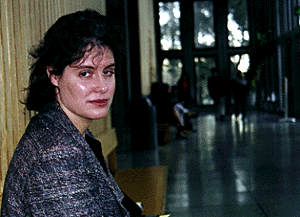![[Currents header graphic]](/homeart/currents_header.gif)
![[Currents header graphic]](/homeart/currents_header.gif)
January 12, 1998

|
|
Shayna Lazarevich
|
Years of persistent police work paid off late last month when UCSC police officer Dale Kahoun recognized suspected child abductor Dragisa Lazarevich near the campus police station.
Kahoun and his fellow UCSC officers had seen the suspect's face dozens of times in photographs and videotapes since 1989. That's when Lazarevich picked up his two children for a routine child-custody visit from their mother's on-campus apartment--and stole them away to his native Serbia.
Sasha, now 15, and Andre, 12, were kept in hiding for six years before Serbian authorities--under pressure from the U.S. government--returned them to their mother, UCSC student Shayna Gluck Lazarevich. Dragisa Lazarevich was convicted of child abduction in Serbia and paid a $40 fine for the offense.
"After initially investigating the case in 1989, being allowed to be the one that arrested him was very fortuitous, and I feel very good about it," said Kahoun. "I also know that Shayna and her children have had a cloud lifted from their lives."

|
|
Sasha and Andre, before the 1989 abduction
|
Kahoun and other police officers felt sure that Dragisa Lazarevich would return to Santa Cruz. Said assistant police chief Randy Fedak: "We've always believed it was not a matter of if he would come back, it was a matter of when."
Officers have kept track of his location and appearance as much as possible, created posters with current photos of him and the children, and made connections with officers from the Federal Bureau of Investigation, the border patrol, the airport police, and other agencies across the country.
"We've almost had to assume it's going to happen and have the plans in place," said Fedak. "We were lucky that things happened the way they did."
Since his arrest on campus December 27, Lazarevich has been held in Santa Cruz County Jail on $1.1 million bail. He has pled not guilty to charges of child abduction stemming from the 1989 incident and to charges of attempted child abduction related to his recent arrest. At a preliminary hearing scheduled for Friday, January 16, the evidence against him will be examined to determine if it is sufficient to hold him for trial.
If convicted of both charges against him, Lazarevich could face a maximum sentence of five years in jail, said Assistant District Attorney David Genochio, who is prosecuting the case. Lazarevich could serve less than half that time if he receives credit for good behavior, he said.
Lazarevich may get an additional 10 months maximum in prison if his probation for passport fraud is revoked, said Genochio. He may also be prosecuted by the U.S. Attorney's Office for entering the country illegally.
"In the past, the solution was to deport him," said Genochio. "We tried that and it didn't work. Now we need to try a different approach, which is to put him away for as long as the law will allow."
After Dragisa Lazarevich took their children to Serbia, Shayna Lazarevich, a UCSC Regents Scholar, fought through the courts, the media, and political arenas in the United States and Serbia to regain her children. She received international press attention and the backing of many United States officials and members of Congress.
Shayna Lazarevich's trials didn't end when she regained custody of the children in summer 1995. Her ex-husband entered the U.S. illegally in August of that year, leaving with a new driver's license. In September, Dutch authorities arrested him on outstanding warrants and extradited him to the U.S.
Under rules of the extradition, the U.S. couldn't hand over Lazarevich for prosecution for the 1989 abduction at that time. Instead, they convicted him of passport fraud and deported him in August 1997. By October, officials believe, Lazarevich had returned to California.
"I was stunned that he was so close and that they actually caught him," said Shayna Lazarevich, who is planning to graduate at the end of next quarter with an independent-study degree in cultural politics and writing. She hopes to write a memoir about her experiences for her thesis.
"I've received tremendous emotional and practical support from [faculty members] John Isbister, Roz Spafford, and Olga Najéra-Ramírez," she said. "They provided me with a lot of encouragement, ideas, and excellent guidance."
Shayna Lazerevich also expressed thanks to Chancellor Greenwood, who wrote letters to U.S. Senators Barbara Boxer and Dianne Feinstein and the Immigration and Naturalization Service on her behalf, and to Tom Reefe, former director of the Career Center, who helped the UCSC senior keep her Regents Scholarship when she took a leave from school.
She's thankful for faculty and staff who allowed her flexibility in her studies. Frequent interruptions for court appearances and lobbying trips have meant she's withdrawn from many classes during her years here.
Shayna Lazarevich is also grateful for the years of police work done on her behalf. The UCSC police, she said, "saved my children from a second abduction."